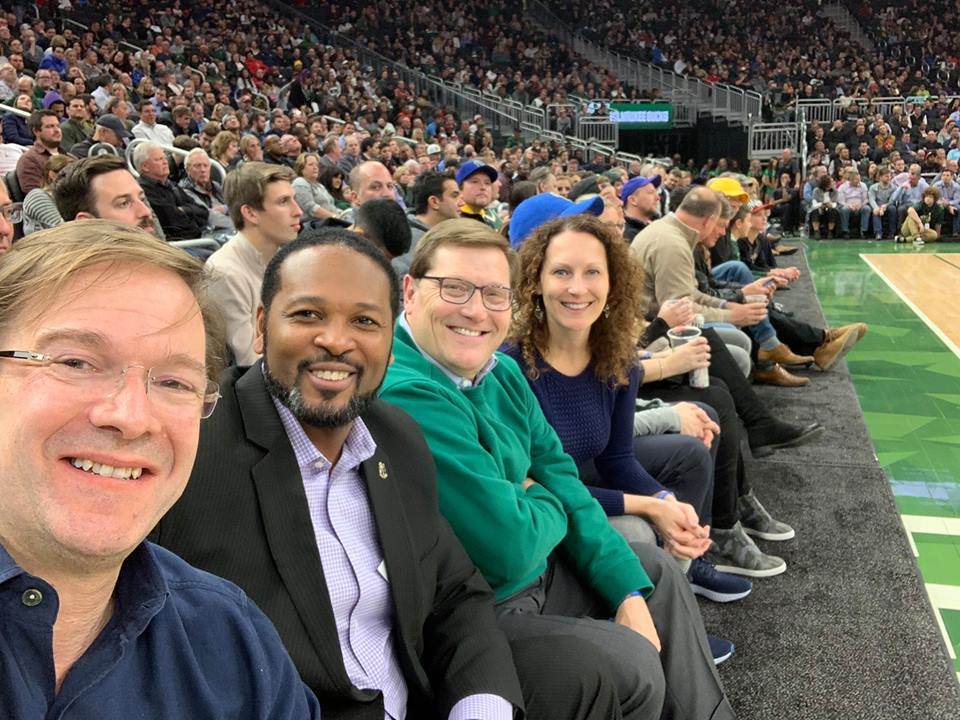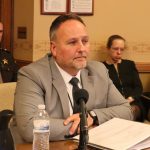Ashanti Hamilton Files for Mayoral Run
Is Chris Abele planning to back Hamilton?
Common Council President Ashanti Hamilton has taken the first step to run for mayor.
The City Hall veteran filed Wednesday to convert his campaign account into a mayoral campaign account, raising his maximum contribution limit from $770 to $6,000.
Hamilton would join a now crowded field for mayor. Urban Milwaukee broke the news in June that Mayor Tom Barrett told supporters he’s running again. Alderman Tony Zielinski, the only candidate to publicly commit to running, announced on November 29th, 2017 at the police union headquarters.
The alderman, first elected in 2004, then spent Wednesday night courtside at the Milwaukee Bucks game with season-ticket holder, County Executive and millionaire political donor Chris Abele.
The County Executive made sure the public knew who he was at the game with by posting a photo of himself, Hamilton, political consultant Scott Neitzel and Jennifer Gonda on Facebook with the caption: “Always great watching a Bucks game. Even better with people who love this city as much as I do! Go Bucks!”
Gonda, who is dating Abele, issued a surprise resignation from a high-ranking position within the Barrett administration in October. At the time, numerous City Hall sources indicated that they thought the move was a precursor to Abele either running for mayor himself or strongly-backing another candidate. The philanthropist gave a maximum campaign contribution to Hamilton in 2016.
The once strong relationship between Barrett and Abele is reported to have broken down over the negotiations surrounding the public funding for the Fiserv Forum. Gonda, who was dating Abele at the time, led the negotiations for the city. Barrett also made the decision not to endorse Abele in his competitive 2016 re-election bid. Hamilton backed Abele and spoke at Abele’s inauguration.
Barrett and Hamilton have a cordial relationship, with the two routinely working together even as the council has increasingly battled the mayor.
Abele’s courtside photo also includes another key player in the arena financing debate. Neitzel served as the Secretary of the Department of Administration under Governor Scott Walker during the financing debate.
Next Steps
Hamilton has not publicly announced a campaign for mayor. And despite creating the campaign finance account, Hamilton, and the other candidates, still need to circulate nomination papers to appear on the ballot.
The alderman, a graduate of Marquette University and Riverside University High School, was rumored to be a possible mayoral candidate in 2017 when Zielinski announced. Hamilton earned a law degree from Texas Southern University. Prior to his election to the council Hamilton worked as a teacher.
Should he run and win, Hamilton would be the first African-American elected to the post of mayor. Marvin Pratt, the longtime council president, served briefly as mayor following the resignation of John Norquist in 2004.
In a statemement, Hamilton said: “People from across our City have expressed a need for new leadership and a true vision for the future of Milwaukee. Many people are asking me to prepare to be a candidate for mayor. I am currently taking this request under consideration and I expect to make a decision and have a formal announcement in the coming weeks. The committee registration filing is a first step in that direction.”
All elections of City of Milwaukee offices are non-partisan. The two top vote getters in a February 2020 primary will advance to the April 2020 general election.
Zielinski vs Hamilton
While Barrett holds a clear fundraising and name recognition advantage in the race, Hamilton and Zielinski have found themselves sparring for months.
Exercising his authority as council president in June, Hamilton removed Zielinski from his powerful post as chair of the Licenses Committee.
In a comment to Urban Milwaukee on why he removed Zielinski, Hamilton said: “There were a number of issues, some have been reported on already… He was very clearly running for mayor, not present enough to be able to take on these responsibilities.” But if Hamilton’s now running for mayor, will he hold himself to the same standard?
The two engaged in a public war of words in October that ended up revealing an ongoing criminal investigation into the troubled Health Department. In response to a press release from Zielinski, Hamilton issued an open letter that read in part: “We are, as a City, trying to respond appropriately to this crisis while you and your accomplices offer only criticism and conspiracy theories wrapped in misinformation and confusion. So, as your leader, I ask that you excuse yourself from the table where the hard decisions are being made or I, by God’s will, will excuse you…again.”
And this Tuesday, during the full Common Council, the two traded subtle jabs. Zielinski took the unusual step of denying Hamilton unanimous consent to change his vote on a procedural vote. Hamilton then shot back by declaring Zielinski “absent” on a vote when the latter briefly left the council chambers, while granting Ald. Robert Donovan “excused” status under similar circumstances.
According to Zielinski, the feud goes back to Hamilton’s ascension to council president. Zielinski says that to earn the backing for council president of Donovan, Mark Borkowski and himself, Hamilton had promised to deny Barrett’s reappointment of Department of City Development Commissioner Rocky Marcoux, and then went back on the deal.
If you think stories like this are important, become a member of Urban Milwaukee and help support real, independent journalism. Plus you get some cool added benefits.
More about the 2020 Mayoral Race
- City Hall: Barrett, Taylor Debate Remotely for Mayor - Jeramey Jannene - Mar 30th, 2020
- 9 Election Takeaways - Jeramey Jannene - Feb 19th, 2020
- Vote Tuesday: Mayoral Candidates - Jeramey Jannene - Feb 14th, 2020
- City Hall: Presenting the “Real State of the City” - Jeramey Jannene - Feb 12th, 2020
- State of the Other City Address - Ald. Tony Zielinski - Feb 10th, 2020
- Barrett dodges debate? - Ald. Tony Zielinski - Feb 9th, 2020
- Slow To Question, Slow To Respond - State Sen. Lena Taylor - Jan 30th, 2020
- City Hall: Meet the Candidates for City Offices - Jeramey Jannene - Jan 15th, 2020
- City Hall: Conservative in Mayor Race Ejected - Jeramey Jannene - Jan 15th, 2020
- City Hall: Taylor Blames FPC Problems on Mayor - Jeramey Jannene - Dec 5th, 2019
Read more about 2020 Mayoral Race here
Political Contributions Tracker
Displaying political contributions between people mentioned in this story. Learn more.
- December 23, 2020 - Tom Barrett received $500 from Rocky Marcoux
- December 22, 2018 - Tom Barrett received $500 from Rocky Marcoux
- March 31, 2018 - Bob Donovan received $50 from Mark Borkowski
- December 29, 2017 - Tom Barrett received $500 from Rocky Marcoux
- October 10, 2017 - Ashanti Hamilton received $100 from Marvin Pratt
- March 1, 2017 - Tom Barrett received $400 from Rocky Marcoux
- February 8, 2016 - Ashanti Hamilton received $200 from Marvin Pratt
- February 8, 2016 - Ashanti Hamilton received $770 from Chris Abele
- December 30, 2015 - Tom Barrett received $400 from Jennifer Abele
- September 8, 2015 - Bob Donovan received $50 from Mark Borkowski
City Hall
-
Council Blocked In Fight To Oversee Top City Officials
 Dec 16th, 2025 by Jeramey Jannene
Dec 16th, 2025 by Jeramey Jannene
-
Latest Effort to Adopt New Milwaukee Flag Going Nowhere
 Dec 3rd, 2025 by Jeramey Jannene
Dec 3rd, 2025 by Jeramey Jannene
-
After Deadly May Fire, Milwaukee Adds New Safety Requirements
 Dec 2nd, 2025 by Jeramey Jannene
Dec 2nd, 2025 by Jeramey Jannene






















A Mayoral race in Milwaukee with an African American as a very serious candidate? Could this really drive the Republican legislators as another excuse to move the Supreme Court election to a different date? The mayoral primary and/or general election could bring out a large number of city residents who traditionally vote Democratic!
Unless I’m missing something, even under the GOP’s proposed election change, the 2020 mayoral elections would still be on the same date as those for the state supreme court (since both are non-partisan races).
The GOP’s “justification” for moving the 2020 presidential primary was separating the non-partisan races (like state supreme court and mayor) from the partisan presidential ballot. Scott Walker (referring to his time as Milwaukee County Executive—another non-partisan office) said as much when he was quoted in the Journal–Sentinel:
“I always thought it was odd that those of us who were in nonpartisan office were on the ballot the same time as there were partisan elections…”